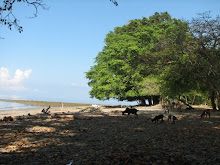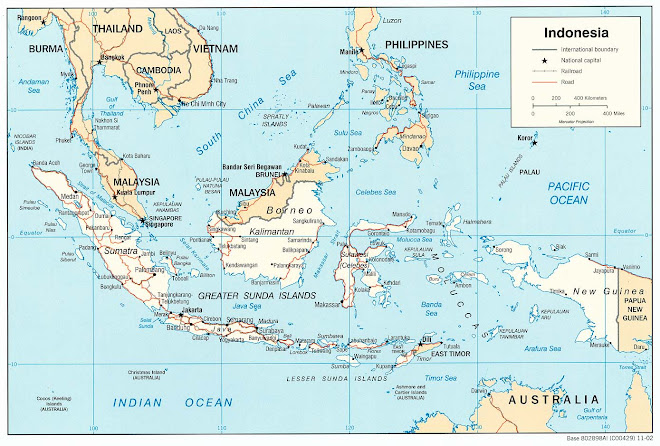
Indonesia is an archipelago in southeast asia consisting of more than 17,000 islands and straddling the equator. The largest islands are sumatra, java (the most populous), bali, kalimantan (Indonesia's part of borneo), sulawesi (celebes), the nusa tenggara islands, the moluccas islands, and irian jaya (also called west papua), the western part of new guinea. Its neighbor to the north is malaysia and to the east is papua new guinea.
Indonesia, part of the “ring of fire,” has the largest number of active volcanoes in the world. Earthquakes are frequent. Wallace's line, a zoological demarcation between asian and australian flora and fauna, divides Indonesia. It lies in southeast asia. Comprising more than 17,000 islands, it is the world's largest archipelagic state. With a population of 222 million people in 2006[4], it is the world's fourth most populous country and the most populous muslim-majority nation, although officially it is not an islamic state. Indonesia is a republic, with an elected parliament and president. The nation's capital city is jakarta. The country shares land borders with papua new guinea, east timor and malaysia. Other neighboring countries include singapore, the philippines, australia, and the indian territory of the andaman and nicobar islands.
The Indonesian archipelago has been an important trade region since at least the seventh century, when the srivijaya kingdom formed trade links with china. Indonesian history has been influenced by foreign powers drawn to its natural resources. Under indian influence, hindu and buddhist kingdoms flourished from the early centuries ce. Muslim traders brought islam, and european powers fought one another to monopolize trade in the spice islands of maluku during the age of discovery. Following three and a half centuries of dutch colonialism, Indonesia secured its independence after world war ii. Indonesia's history has since been turbulent, with challenges posed by natural disasters, corruption, separatism, a democratization process, and periods of rapid economic change.
Across its many islands, Indonesia consists of distinct ethnic, linguistic, and religious groups. The javanese are the largest and most politically dominant ethnic group. As a unitary state and a nation, Indonesia has developed a shared identity defined by a national language, a majority muslim population, and a history of colonialism and rebellion against it. Indonesia's national motto, "bhinneka tunggal ika" ("unity in diversity" lit. "many, yet one"), articulates the diversity that shapes the country. However, sectarian tensions and separatism have led to violent confrontations that have undermined political and economic stability. Despite its large population and densely populated regions, Indonesia has vast areas of wilderness that support the world's second highest level of biodiversity. The country is richly endowed with natural resources, yet poverty is a defining feature of contemporary Indonesia.
.jpg)





No comments:
Post a Comment